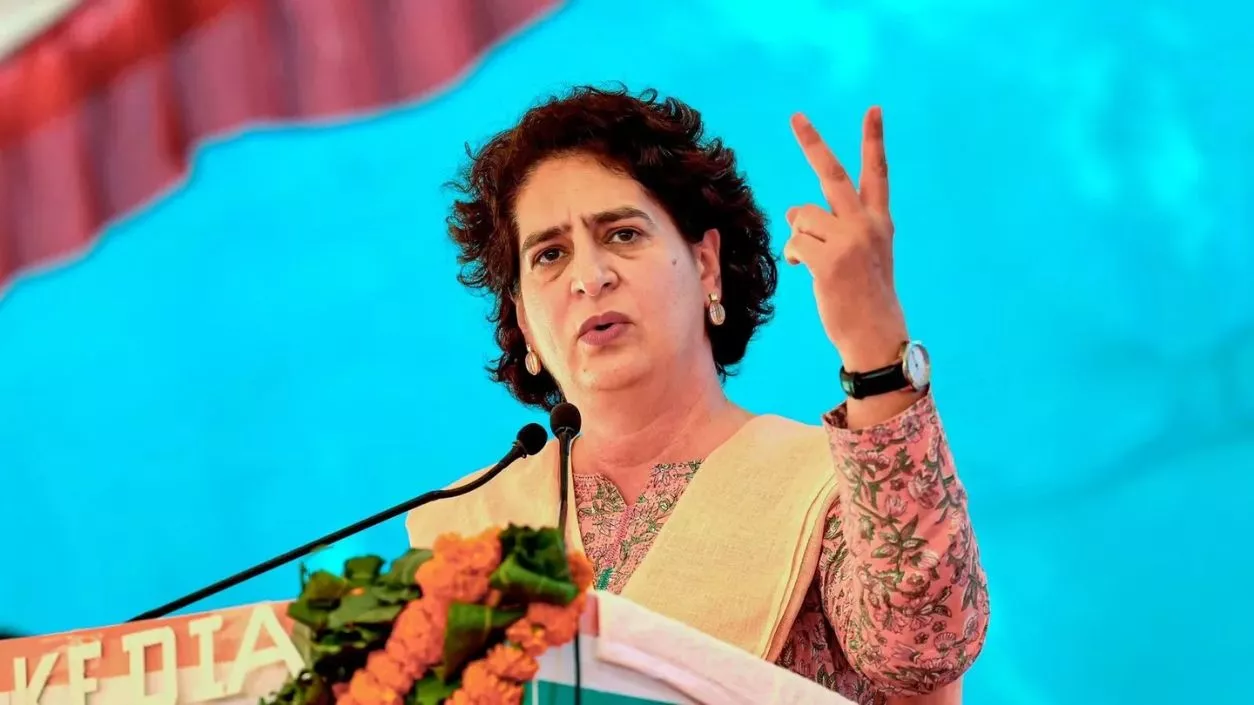CPI(M) leader beaten on road in Kharagpur for protesting wall demolition, shirt torn
.gif)
.gif)

Priyanka Gandhi Vadra, the newly elected Member of Parliament from Wayanad, delivered her maiden speech in the Lok Sabha on Friday during the 75th anniversary of the adoption of the Indian Constitution. She focused on the principles of justice, equality, and freedom, which she argued are being undermined by the ruling Bharatiya Janata Party (BJP)-led government. Gandhi's address criticized the government's approach to reservation policies, privatization, and the centralization of power in the hands of a few.
Gandhi began by recalling the significant contribution of Dr. B.R. Ambedkar, the architect of the Constitution, to the formation of a document that guarantees fundamental rights to all citizens. She referred to the Constitution as a “protective shield” for justice, unity, and freedom of expression, noting that it provides the citizens with the power to raise their voice against any injustice. She argued that over the past decade, the government has actively worked to break this shield. “This government is working to weaken the reservation policy through lateral entry and privatization,” Gandhi stated, voicing concerns over recent government actions that might dilute policies meant to ensure representation for marginalized communities.
In a personal anecdote, Gandhi recounted the story of Adnan and Uzair, two boys from Sambhal whose father, a tailor, was killed by police. Gandhi shared that the children’s father had one dream: for his sons to get an education and pursue successful careers. Despite the tragic loss, Adnan, the elder son, expressed his determination to become a doctor, a dream he said was inspired by the vision set forth in the Constitution. Gandhi emphasized that the Constitution gave the children the strength and hope to pursue a future, highlighting its role in empowering individuals from disadvantaged backgrounds.
Criticizing the government for what she called the undue favoritism toward corporate interests, Gandhi pointed specifically to the concentration of wealth and business in the hands of the Adani Group. She claimed that essential sectors like railways, airports, and cold storage facilities were being transferred to Adani, which she argued was detrimental to the interests of the general public. “One person is being favored and 142 crore Indians are being ignored,” Gandhi said, highlighting the disproportionate influence of one individual on multiple key sectors in the country.
Gandhi also addressed the issue of the caste-based census, calling it "the need of the hour." She argued that a caste census is essential for understanding the conditions of marginalized communities and for creating targeted policies to address their specific needs. She criticized the government for dismissing the importance of such a census, which could provide the data necessary to tackle inequality. "A caste census is the need of the hour," Gandhi said, emphasizing that the information would help in designing effective and inclusive policies for the welfare of all citizens.
In response to the BJP's frequent references to Jawaharlal Nehru’s legacy, Gandhi reaffirmed that Nehru's contributions to nation-building cannot be overlooked. She outlined how Nehru was instrumental in establishing major national institutions such as Hindustan Aeronautics Limited (HAL), Bharat Heavy Electricals Limited (BHEL), Oil and Natural Gas Corporation (ONGC), and several IITs and IIMs. Gandhi reminded the House that Nehru’s role in the freedom movement and in building key infrastructure for India’s development continues to have a lasting impact. “His role in the freedom of this nation, in building this nation, can never be erased,” she said.
Concluding her speech, Gandhi expressed the view that the government’s current actions would be challenged by the people of India. She suggested that if elections were conducted through ballots, the truth about the government’s policies would become clear. Her speech focused on the importance of upholding the Constitution, ensuring social justice, and protecting the rights of marginalized communities through a fair and transparent government. Gandhi's maiden speech positioned her as a vocal advocate for preserving democratic values and holding the government accountable.